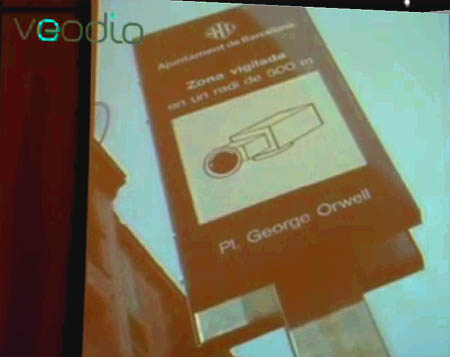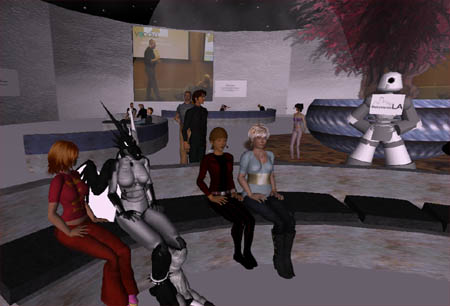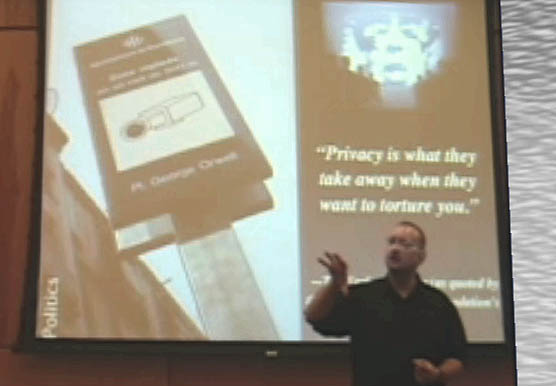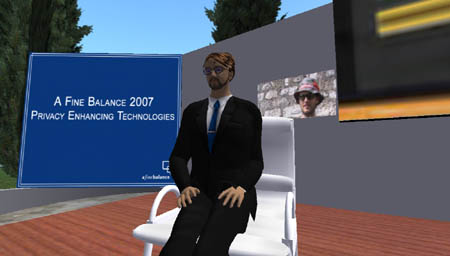
If the metaverse goes wrong it’s going to be a “dark world” with only a few points of light, Jamais Cascio said in his talk to Stanford University’s Metaverse Meetup that was also streamed in Second Life. The topic was: The Metaverse — what does it include, where is it going, and how will it change our lives? But, as Cascio notes on his blog here, during the meetup he “got into a discussion about what happens to control over one’s own information in a world of information saturation.”
But while Cascio pointed out many of the ways which the metaverse by “making visible the invisible” (Bruce Sterling) can enable us to make smart and hopefully wise choices about our world, his presentation had a cautionary note. He said he is a “clear eyed optimist.” He believes that the future is in our hands. And, we need to make the right choices and build the future we want.
We are living in an exciting moment as these technologies are emerging today.
But we live in a world of “asymetric transparency” where people who have economic, political, social and religious power have the ability to know what we are doing and we don’t have the reverse unless we go through a lot of trouble.
Questions about digital public space and control of you own persona are keys to whether the “metaverse goes wrong” or not.
Cascio showed the slide (opening this post) of the George Orwell Plaza in Barcelona which is surrounded by surveillance cameras. Brad Templeton has argued that widespread transparency technologies will inevitably be corrupted and co-opted by those in power. Templeton argues:
If you put in place the tools which would make a police state possible, they make the police state inevitable. Repressive states are real; near-panopticons are real; transparent utopias are hypothetical.
See here for Cascio’s look at the privacy debates from the Accelerating Change Conference 2004 with David Brin, author of The Transparent Society ,who argues “that surveillance technologies are here, and we should fight to make sure that they are two-way, and not just in the hands of elites” and, Brad Templeton, chairman of the board at the Electronic Frontier Foundation).
Jamais Cascio’s has put forward the notion of a participatory panopticon. This idea is exemplified in the Witness project which provides video cameras to human rights activists around the world in order to document violations and abuses. Cascio suggests a similar model might work for an “Earth Witness” project, “a second superpower” army of networked environmentalists:
imagine a web portal collecting recordings and evidence of ecological problems (human-caused or otherwise), environmental crimes, and significant sources of greenhouse gas emissions.
Cascio has suggested designs for an earth witness phone.
During his talk, Cascio gave several powerful examples of the potential for a participatory panopticon to benefit people and the planet. He mentioned the work of Dr. Larry Brilliant who is famous for his role in eradicating smallpox. Brilliant is now Executive Director of Google.org. One of Brilliant’s current projects is to skim info out of public databases and newspapers from all over the world and construct a map to aid in a prediction about where the next pandemic might come. But the question of privacy loomed large in Cascio’s talk.
“Privacy is what they take away when they want to torture you.†The Earl of Spencer
The above quote was side by side in Cascio’s slide of surveillance cameras in George Orwell Plaza, Barcelona. While privacy advocates are winning some battles, notably in the recent changes by Facebook to the Beacon advertising system (see New York Times, CNET and MSNBC for more):
[they] will allow users to “opt-in” to sharing information through the service, which broadcasts purchases made on outside websites to Facebook users’ friends.
MoveOn.org, the on-line advocacy group commented that this was a “big step in the right direction.” But, we are still a long way from a situation where surveillance technologies are not primarily in the hands of elites. Albumoftheday reveal serious “big brother” underpinnings to Facebook.
I visited Eben Moglen, founder, Director-Counsel and Chairman of Software Freedom Law Center, recently (the interview is upcoming in next post). Moglen is deeply concerned that:
An entire generation of people are now fundamentally mis-reasoning about what it’s like to behave in surveillance spaces, who are being led to the slaughter in a very unpleasant fashion, in which they have agreed to move large parts of their private life into instrumented environments, big brother houses, built by people who want to use that data for the purpose of influencing their behavior economically and in other ways. And, they don’t have informed consent. And, they don’t have structures of regulatory intervention.
I attended Cascio’s talk as my avatar Tara5 Oh (above) in Second Life. Henrik Bennetsen was fielding questions from Second Life, so I asked Jamais Cascio two questions that have stuck in my mind since talking with Eben Moglen. The whole of Cascio’s talk will be posted to the web here soon. But, here is a transcription of Cascio’s reply to the questions I asked:
“Is store it yourself fundamental to freedom in the 20th Century?” and, “Who gets the logs?”
The question of who gets the logs is actually does summarize very nicely the fundamental dilemma of this kind of environment. Because who gets the logs is really a proxy for who gets control. Who ultimately has the final say in what we do with the information we create about ourselves. I think that it would be wonderful if we could have complete individual control over that information. That is however unlikely. So rather than rail against the unfairness of it all, and rather than simply lying back and accepting it, the choice here is to really fight for as much as we can, to try to be active, be vocal, be responsive, and push for whatever you can get, as much as you can get, knowing that ultimately the compromises that will emerge. And it will be a compromise as something that will be the best you could get as opposed to something that was just imposed upon you.
Jamais in his post meetup blog post continues to examine the question: “If privacy is effectively unattainable, or the institutions to protect privacy are too weak to withstand the relentless expansion of Internet observation, what recourse would those wishing to maintain some control over their external visibility have available?”
He makes a provocative suggestion:
One possible alternative: intentional misinformation about oneself, reducing the “signal to noise” ratio of networked transparency.
A Fine Balance – privacy and identity portability
On November 21st a workshop was held in Second Life to look at “How can you protect your privacy in virtual worlds?” This workshop was part of a “real” life event: “A Fine Balance 2007 – Privacy enhancing technologies: How to create a trusted information society” held in London. The keynote speaker, Paul Ledak (IBM, USA) and chairman: Jan Camenisch (IBM, Zurich), pointed out that a key area of “fine balance” is “maintaining privacy while enabling identity portability.” Protecting privacy poses some challenges to the goals of interoperability because large parts of the metaverse might end up to be shared reality only to a community of trusted peers.
Organised by three of the UK’s Knowledge Transfer Networks (KTN), and supported by the European Commission, A Fine Balance 2007 is an independent forum for discussing privacy in relation to the development of new technology (see Knowledge Transfer Innovations).
Building on last year’s event of the same name, this year’s conference discusses the development and integration of technologies which can build privacy into new devices and services at the design stage.
Privacy Enhancing Technologies (PETs) will encourage industry to recognize that valuable emerging technologies can be designed with privacy and data security in-mind from the outset. Full details may be found here.
On May 2nd, the European Commission adopted a Communication “Promoting Data Protection by Privacy enhancing Technologies (PETs)” in which it calls for stepping up research in and development of PETs. In this context, the outcomes of this event will be taken under consideration by the European Commission in its formulation of upcoming work programmes for funding calls in this area of the FP7 – ICT programme and will influence the direction of future research in the fields of privacy and technology.
The original European Commission Communication can be found here:
There is an interesting argument by Kightlinger that the different approaches of the US and EU may not be as different as they appear. (The European Union (EU) adopted comprehensive privacy legislation in 1995 and special privacy legislation for electronic communications in 2002.) While the EU emphasis is more on the need for bureaucratic control to “protect” individual privacy the US emphasis more on the need to “protect” individual “freedom.” Kightlinger argues that debates about the relative merits of the two regimes, regardless of differences in detail, strengthen the hold of a the same post enlightenment paradigm where “we find ourselves living in the culture of bureaucratic individualism, and debates about public policy issues predictably become debates about which side of the dyad, individual or bureaucracy, to emphasize at any given time.” And the important point he makes is how very hard it is to see these issues from other viewpoints.





December 3rd, 2007 at 5:48 pm
dont kid yourselves……every corporate vr world being blogged about during this bubble will require as the first step to there usage, that you allow them to own all your data. or provide them that ubiquitous “totally free license to distribute in any way in any universe” all that you place onto there storage devices.
by them way, not 1984 by orwell, but “the machines stop” by em forster is a better blog fodder book to use……
http://en.wikipedia.org/wiki/The_Machine_Stops
but it is good to see that “only” 2 years into the hippie utopias of SL..and only 15 years after the same from jaron lanier and others that some reality is finding its way into vr again,..
not that it was ever not there before….as EM so suggested so long ago.
c3
December 3rd, 2007 at 11:05 pm
To avoid oppressive control, creating and running virtual worlds must be something that any interested party can do. If Black Sun runs the entire world, then anyone wanting to seize control only needs to attack a single point.
To make sure that the greater virtual world isn’t, in the end, an ocean of smaller islands, we need to make sure that the virtual worlds can talk to each other; letting differently simulated entities share a common playground, and letting people from different regions and walks of life all share a distributed, shared experience.